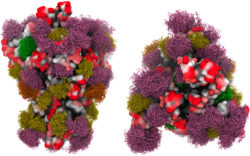It’s hard to believe we’re here again: Another fall in Athens, facing the threat of a virus that’s now mutated to the new, more contagious Delta variant that could very well overwhelm our local health-care system.
Up until just a few weeks ago, it looked like Athens would have real return to normalcy again this fall––with football games and tailgating, concerts and festival events rescheduled from the spring. In two weeks time, however, a rapid increase in cases has resulted in COVID-19 patients flooding local hospitals. Last week there were 95 COVID patients, or 15% of all hospitalizations, and rising in the region’s hospitals, according to hospital patient census data for Region E. Many of these hospitalizations are from surrounding counties with even lower vaccination rates than Clarke County, at this point, and ICU space is near capacity, with 65 beds, or 95%, in use as of last week. Both Piedmont Athens Regional and St. Mary’s have been on diversion again—meaning they are full and directing non-emergency patients to other hospitals—typically taking turns if they’re both overwhelmed.
“For the last few months, we typically had roughly 5-7 COVID-19 patients on a given day between our facilities and began to see volumes increase over the last few weeks. Volumes have made it necessary for our Athens hospital to go on diversion from time to time as well, including this morning,” Montez Carter, president and CEO of St. Mary’s Health Care System, said in a statement to Flagpole Aug. 4. And on Aug. 6, Piedmont Athens Regional announced it would restrict patients to two designated visitors who must pass a health screening and wear a mask while inside the hospital.
To date, there have been 13,493 confirmed COVID cases in Clarke County. In just the last two weeks, Athens has seen an increase of 382 new cases, and the seven-day moving average has increased from 10 on July 23 to 36 as of Aug. 5. The virus has killed 143 Clarke County residents, although only one in July.
Facing the prospect of this new variant, Athens-Clarke County reinstated its mask mandate for indoor spaces and approved a vaccine mandate for all county employees. The mask mandate ordinance is automatically lifted if cases decline to a rate of less than 100 cases per 100,000 people in a week in Clarke County or if the county reaches an 80% vaccination rate. Ahead of the beginning of the school year, the Clarke County School District also adopted a mask mandate for everyone before classes began on Aug. 4.
However, ACC ordinances don’t apply on state property like the UGA campus. UGA—hamstrung by Gov. Brian Kemp’s ban on mask and vaccination mandates for any state government entity—is only strongly encouraging vaccination and mask wearing through social media campaign messaging (the UGA football team is touting an 85% vaccination rate) and incentives. Students who are vaccinated at the University Health Center or other pop-up sites on campus receive a $20 gift card to a local business and a T-shirt, as well as be entered into a drawing for a $100 gift card; 10 will be chosen each week for the next four weeks.
According to UGA’s report from the COVID Response Committee meeting on July 26, the largest effort on campus will be vaccinations, but response from the UGA community via a recent survey suggests that there’s an internal push to do more.
“The data indicate that areas of greatest concern focus on safety and preventative measures on campus, including the lack of mandatory vaccinations, masking or testing, and no requirement for social distancing as directed by the University System of Georgia,” the report notes. “Many of the faculty, staff and students in the UGA community have expressed apprehension about the opening of fall semester without these critical mitigation measures in place, particularly in light of the COVID-19 Delta variant and low vaccination rates on campus and in the Athens community.”
Despite the difference between the two pandemic management styles and the tension between town and gown as we near the fall semester, both depend on the community to step up and do two things: wear a mask indoors and get more people vaccinated. “We continue to believe that our best way out of the pandemic—including addressing the state’s growing inpatient COVID population—is for those who are eligible to get vaccinated while also following CDC guidance: wear a mask when indoors in public areas, watch your distance and wash your hands,” said Piedmont Athens Regional communication specialist Sarah Teach.
In the absence of any stringent mitigation policies on campus, what the fall semester on campus and around town will look like hangs in the balance. UGA students, by and large, have the chance to ensure everyone gets to enjoy the fall we had all imagined. “I would suggest to all incoming students, as with everyone, that getting vaccinated helps you, helps the community and helps keep the ones you love safe,” said Athens Mayor Kelly Girtz. “Remaining unvaccinated means that you are unwittingly putting others in harm’s way.”
The surge local hospitals are experiencing belies the notion that Delta isn’t a real threat. The variant is causing more serious illness among younger people than previous strains. And it’s not only a threat to the unvaccinated, but a threat to anyone who needs the hospitals’ strained resources for any reason.
“Many COVID patients require extended lengths of hospital stay due to the severity of their symptoms. As a result, as our COVID numbers rise, so does the strain on our bed capacity,” said Carter, the St. Mary’s CEO. “We continue to see higher numbers of COVID patients in their 30s, 40s and 50s than we saw in previous surges. In addition, the vast majority of our current hospitalizations are from patients who have not been vaccinated. This is consistent with reported national trends. Per CDC guidance, we urge everyone to get vaccinated and to return to masking and social distancing to control the spread of the dangerous and highly infectious Delta variant.”
Clarke County’s vaccination rate remains relatively low. As of last week, 54,359 Clarke County residents, or 43%, had received at least one dose, and 49,910 residents, or 40%, were fully vaccinated, according to the Georgia Department of Public Health vaccine dashboard. In the last two weeks, there were 1,895 new doses administered. While students aren’t yet back to class and fully on campus, UGA’s vaccination data throughout the summer showed very low rates of vaccination. The good news is that UGA has a large supply of all three vaccines on hand and ready to be given out. Free vaccines and testing are also available at the Clarke County Health Department and most any pharmacy or urgent care center.
However, it’s difficult to say just how accurate those numbers are. When a vaccinated person’s county of residence is initially unknown, DPH is backfilling that data, which accounts for the vast discrepancy between its county-level data and the CDC’s. But the inclusion of UGA students complicates matters further. They are counted as Clarke County residents if their ID lists a Clarke County address, but many students’ IDs list their hometown address.
Mask mandates are not limited to blue states or liberal campuses. Even other SEC schools—including Alabama, Auburn, Tennessee, Kentucky, Missouri, Ole Miss and Mississippi State—are requiring masks indoors this fall.
“The consensus was clear that mandatory indoor masking is a prudent and appropriate step, given rising rates of COVID-19 infections, dominated by a more transmissible variant,” Kentucky President Eli Capilouto wrote in a letter to the university community. “Let me be clear: The most important protection against the virus remains vaccines. Nothing else is close. The science is unequivocal on that fact.” He added that 70% of UK students and faculty are vaccinated.
Matthew Boedy, a professor at the University of North Georgia’s Gainesville campus who’s been tracking Georgia college pandemic data, has been a staunch advocate for more action by USG. His letter to USG requesting a mask and vaccination mandate for the upcoming semester has gone unanswered.
“It’s clear that USG schools and their administrations are caught between a rock and a hard place. They know mandates—vaccine and mask—would make campus safer,” he said. “It’s clear that politics is beating science at this stage. The governor is ignoring the facts on the ground, and the people on campus are suffering and will suffer because of it. It will get worse before it gets better. If Georgia DPH data on vaccinations by age is any indication, schools will become campuses of the largely unvaccinated very soon. The spikes that will result are entirely preventable.”
Vaccine mandates at colleges are nothing new. USG already requires incoming students to be vaccinated for measles, mumps and rubella, chicken pox, tetanus, diphtheria, pertussis and hepatitis B, as well as meningitis if living in a dorm.
Joe Fu, a member of the United Campus Workers of Georgia union and mathematics professor at UGA, is anxious about the upcoming semester and disappointed, albeit not surprised, at the absence of leadership at UGA and USG in the face of this pandemic. UCWG’s COVID committee is back up and running and will be taking action in the weeks to come.
“We’re exhausted, but just in the past couple of weeks the realities are starting to break through,” Fu said. “It looks like we’re going to have a much, much worse situation on the ground than we did last year.”
Like what you just read? Support Flagpole by making a donation today. Every dollar you give helps fund our ongoing mission to provide Athens with quality, independent journalism.










